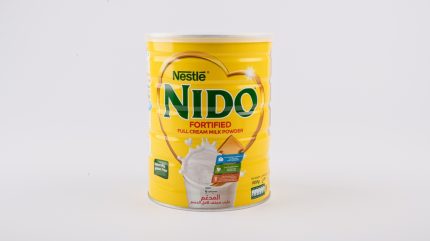
A report claims Nestlé adds sugar and honey to certain brands of infant-formula and breakfast cereals in poorer countries, a practice not evident in Europe.
Public Eye, a Zurich-based NGO, and the International Baby Food Action Network (IBFAN), initiated analysis of 150 Nestlé products sold in “lower-income countries”.

Discover B2B Marketing That Performs
Combine business intelligence and editorial excellence to reach engaged professionals across 36 leading media platforms.
The results determined that “almost all” the Cerelac branded infant cereals examined contained added sugar, amounting to an average of almost four grams per serving. The highest was detected in the Philippines at 7.3 grams.
For Nido powdered milks produced by Nestlé, the study identified almost two grams of added sugar per serving in “most” of the products, the highest being a product analysed in Panama at 5.3 grams.
“In Switzerland and in Nestlé’s main European markets, such products are sold without added sugar,” the report – ‘How Nestlé gets children hooked on sugar in lower-income countries’ – suggested.
It added: “The paediatricians and child nutrition experts interviewed by Public Eye denounce a double standard that is unjustifiable and problematic from an ethical and public-health perspective, particularly in view of the obesity epidemic affecting low-income countries.

US Tariffs are shifting - will you react or anticipate?
Don’t let policy changes catch you off guard. Stay proactive with real-time data and expert analysis.
By GlobalData“Whereas Nestlé recommends publicly to avoid baby foods that contain added sugar, it takes advantage of the weakness of existing regulations to continue selling such products in lower-income countries.”
Reacting to the report, Nestlé said in a statement provided to Just Food: “We apply the same nutrition, health and wellness principles everywhere.
“Baby food is a highly regulated category. Everywhere we operate, our portfolio complies with local regulations or international standards, including labelling requirements and thresholds on carbohydrate content that encompasses sugars.
“Over the past decade, Nestlé has reduced by 11% the total amount of added sugars in our infant cereals portfolio worldwide.”
Nestlé advertises Cerelac as “nutritious, easily-digested instant cereals” for infants of six months upwards, according to its website, adding the brand is sold in countries such as Belgium, Portugal, India, South Africa and the Philippines.
The Nido range of milk and milk-based products, meanwhile, “offer nutrition solutions for each stage of childhood”, and the “brand is trusted by mothers”.
Public Eye and IBFAN, however, claimed Nestlé “uses misleading marketing strategies, such as utilising medical professionals and social media influencers, to win the trust of parents in its products”.
The organisations said they have launched a petition calling on Nestlé to “stop adding sugar in products for babies and young children under three years old, in every part of the world”.
Nestlé countered in the statement sent to Just Food: “We continue to innovate and reformulate our infant-cereal products in order to further reduce the level of added sugars without compromising on quality, safety and taste.
“We always declare the total sugars in our products, including those coming from honey, for example.
“In a few countries in Europe, consumers can find infant-cereal alternatives with zero added sugar in addition to the regular recipes available with added sugar.”
The Public Eye report quoted comments from Nigel Rollins, a scientist at the World Health Organization (WHO), with regards to the disparity between the added sugar content of Nestlé products sold in poorer countries.
“There is a double standard here that can’t be justified,” he said, noting the practise “is problematic both from a public health and ethical perspective”.
Nestlé was accused in the report of not being “transparent when it comes to added sugar” in the products studied, while the consumer goods giant simultaneously highlights the nutritional benefits.
Public Eye and IBFAN suggest that even if the Nestlé products are marketed as without the addition of the sugar alternative sucrose, “they do contain added sugar in the form of honey”, which they said goes against WHO recommendations when it comes to baby foods.
Nestlé added in response: “In the case of our Nido growing up milks (from 12 to 36 months), all added sugars (sucrose and glucose syrup) are being phased out of our recipes worldwide.
“Nido and Cerelac products (the latter under the Nestlé brand) are sold in Switzerland and other European countries. Slight variations in recipes across countries depend on several factors, including regulations and availability of local ingredients, for example, and in no way compromise the quality of our products.”





